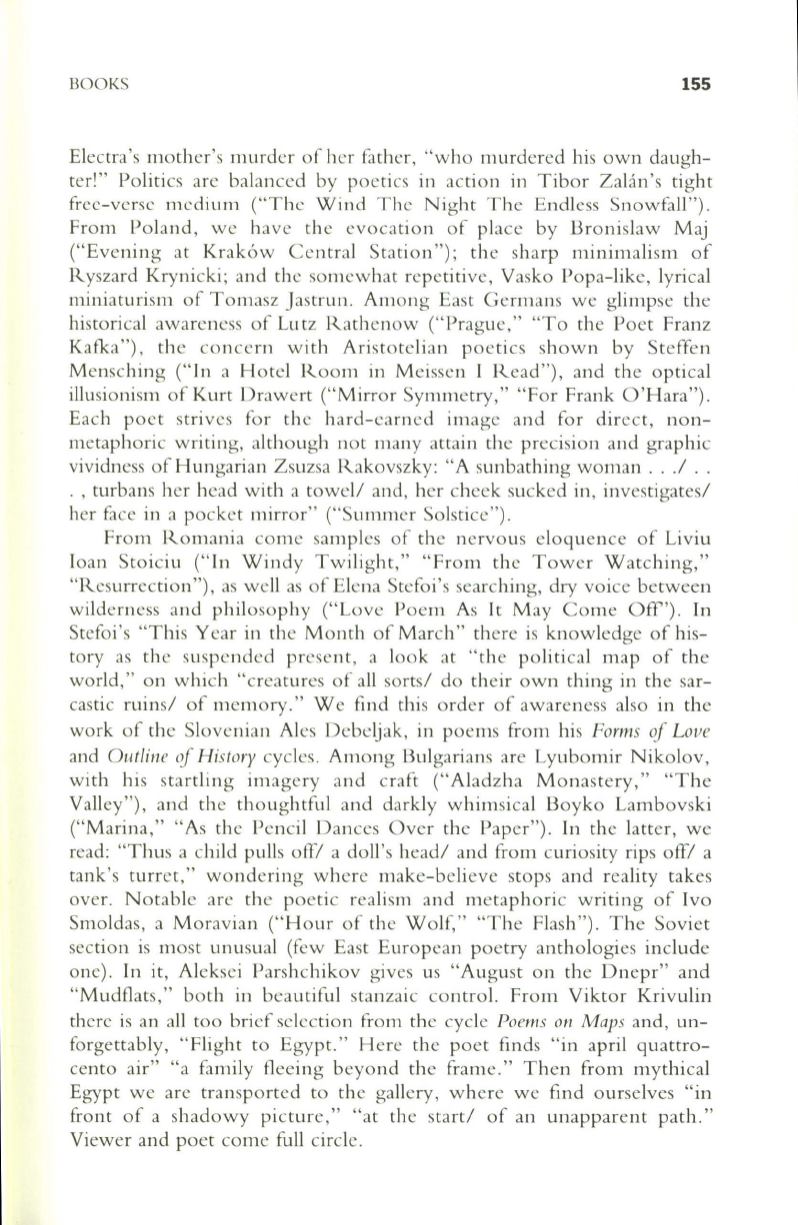
BOOKS
155
Electra's mother's murder of her father, "who murdered his own daugh–
ter!" Politics are balanced by poetics in action in Tibor Zalan's tight
free-verse medium ("The Wind The Night The Endless Snowfall").
From Poland, we have the evocation of place by Bronislaw Maj
("Evening at Krakow Central Station"); the sharp minimalism of
Ryszard Krynicki; and the somewhat repetitive, Vasko Popa-like, lyrical
miniaturism of Tomasz Jastrun. Among East Germans we glimpse the
historical awareness of Lutz Rathenow ("Prague," "To the Poet Franz
Kafka"), the concern with Aristotelian poetics shown by Steffen
Mensching ("In a Hotel Room in Meissen I Read"), and the optical
illusionism of Kurt Drawert ("Mirror Symmetry," "For Frank O'Hara") .
Each poet strives for the hard-earned image and for direct, non–
metaphoric writing, although not many attain the precision and graphic
vividness of Hungarian Zsuzsa Rakovszky: "A sunbathing woman ..
.I ..
. , turbans her head with a towel! and, her cheek sucked in, investigates/
her face in a pocket mirror" ("Summer Solstice").
From Romania come samples of the nervous eloquence of Liviu
loan Stoiciu ("In Windy Twilight," "From the Tower Watching,"
"Resurrection"), as well as of Elena Stefoi's searching, dry voice between
wilderness and philosophy ("Love Poem As It May Come Off'). In
Stefoi's "This Year in the Month of March" there is knowledge of his–
tory as the suspended present, a look at "the political map of the
world," on which "creatures of all sorts/ do their own thing in the sar–
castic ruins/ of memory." We find this order of awareness also in the
work of the Sloven ian Ales Debeljak, in poems from his
Forms of Love
and
Outline of History
cycles. Among Bulgarians are Lyubomir Nikolov,
with his startling imagery and craft ("Aladzha Monastery," "The
Valley"), and the thoughtful and darkly whimsical Boyko Lambovski
("Marina," "As the Pencil Dances Over the Paper"). In the latter, we
read: "Thus a child pulls
off!
a doll's head/ and from curiosity rips off/ a
tank's turret," wondering where make-believe stops and reality takes
over. Notable are the poetic realism and metaphoric writing of Ivo
Smoldas, a Moravian ("Hour of the Wolf," "The Flash"). The Soviet
section is most unusual (few East European poetry anthologies include
one). In it, Aleksei Parshchikov gives us "August on the Dnepr" and
"Mudflats," both in beautiful stanzaic control. From Viktor Krivulin
there is an all too brief selection from the cycle
Poems on Maps
and, un–
forgettably, "Flight to Egypt." Here the poet finds "in apri l quattro–
cento air" "a family fleeing beyond the frame." Then from mythical
Egypt we are transported to the gallery, where we find ourselves "in
front of a shadowy picture," "at the start/ of an unapparent path."
Viewer and poet come full circle.


